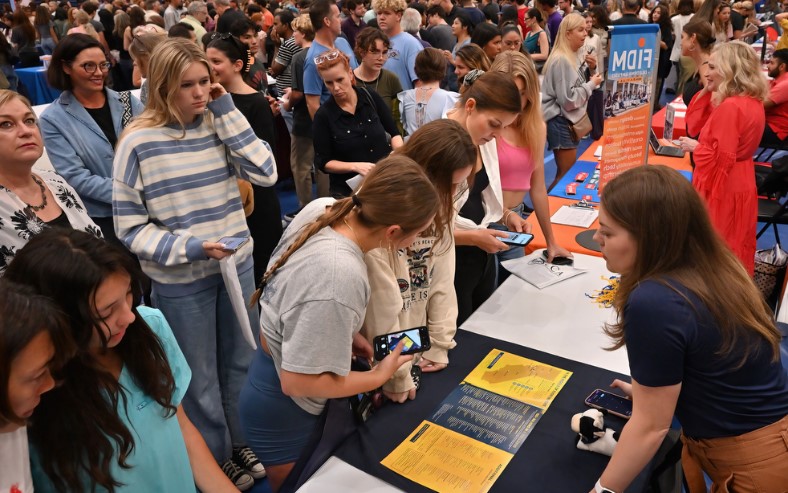Organizing a school college fair is like planting the seeds of future opportunities for your students. Yet, for these seeds to blossom, you need more than just a well-organized event – you need a crowd that’s enthusiastic, engaged, and eager to explore.
In this guide, let’s dive into five heart-centered strategies that go beyond the usual promotional playbook, helping you build anticipation and ensure your college fair becomes a memorable experience for everyone involved.
1. Heartfelt communication
Communication channels at your school may be just communication tools, but they’re also the heartbeat of your community. Speak from your own heart by using newsletters, websites, and the intercom system to talk about the college fair. With such events, share the stories of students who overcame these uncertainties. You just need to have the excitement come out through your words and images so that readers can tell this isn’t going to be like every other event. This is a celebration of possibility.
Make sure the college fair flyer appears as a prominent link on the school website, using graphics that capture the spirit of your event. If you put personality into your communication channels, then even a simple announcement will be humanized in emotional communication that stays with people. For such flyers you can use PosterMyWall as it’s the most trending tool being used.
2. Community collaborations
Your school is not a world in itself but part of society. Establish partnerships with local businesses on a more mutually beneficial basis than that of sponsor and sponsored, but rather as members of the same community working for its common development. When you go to cafes, bookstores, or community centers, bring with you stories of how students at one college can help local kids.
Why not consider holding mini-avenues–controlled, small-scale events that go from the school to society at large? It shouldn’t be a commercial arrangement; it should stem from the common ideal of fostering the hopes of young people. This method turns the college fair into not a school event but rather a celebration of the community, making it much more meaningful.
3. Share stories, not just hashtags
It’s easy to overlook the impact of a good tale in a world dominated by screens. Instead of assaulting your audience with hashtags, concentrate on the narrative. Gather stories from previous participants on how the college expo affected their decisions and opened possibilities they didn’t know existed. Make teaser movies with the voices of kids, professors, and even parents, all of whom are excited about the approaching fair. These genuine tales resonate more deeply than any hashtag, generating a genuine connection that piques people’s interest.
To create a lasting effect that extends beyond social media, invite members of your community to share their stories. Engaging with the human experience not only promotes an event but also invites individuals to participate in a narrative that holds the potential to influence their destiny.
4. Personalized pre-fair experiences
In addition to information sessions, hold events before the main event. Plan personalized workshops and informal get-togethers that fit your students. Don’t be afraid to bring in guest speakers–alumni who have interesting stories that speak to the current students would be ideal. They shouldn’t only be about these facts and figures but should also build a real connection between the students at high school and life outside of it.
How about organizing some activities in which the kids can interact and deal with situations much like those students have to face in real life? That personal touch also makes the weeks of preparatory work before the fair itself a process of self-discovery, by which participants are able not only to collect data but refine their abilities for future use.
5. Alumni as mentors, not just figures
Let past students serve as living testimony to the impact of your school; don’t treat them like names on a poster. Establish contact and ask them to mentor you as well. Ask them to tell you their adventures; ask of trials and tribulations, risks, and rewards instead of success stories. Take them to the fair so they can guide current students through a myriad of opportunities.
Spotlight alumni achievement stories on your website and social media, but don’t just focus on the laurels. model anecdotes which humanize these success stories and make them real to people. The former method turns a far-off alumni network into an intimate community in whose experiences we can also hear the steps of those making their way toward college today.
Conclusion
A sincere, human-centered strategy is needed to effectively promote your school’s college fair; advertising gimmicks alone won’t cut it. A unique experience that goes beyond the conventional idea of an educational event may be created by telling real tales, working with the community, speaking from the heart, providing customized pre-fair experiences, and enlisting alumni as mentors.
These tactics improve enthusiasm and a sense of community that lasts long after the fair ends in addition to increasing attendance. Remember, it’s about fostering an atmosphere where all participants feel heard, visible, and inspired—not just about the statistics. If you use these sincere tactics, the college fair at your school will become a significant occasion that represents a meaningful journey for all participants rather than merely an event.

